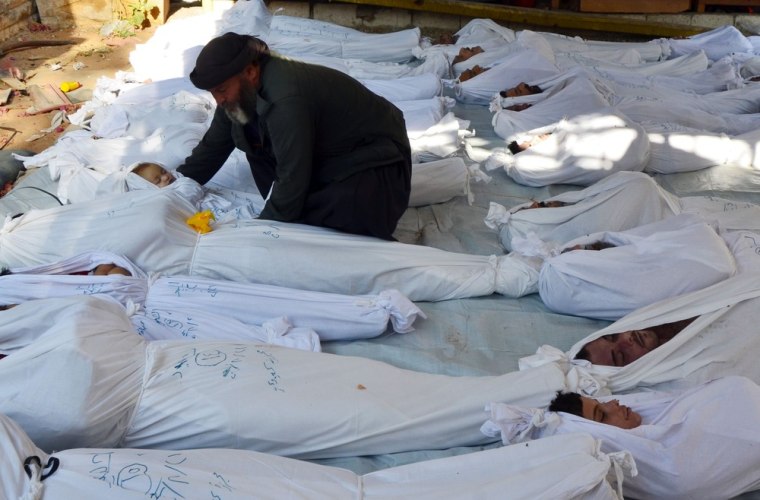Chemical weapons experts say it doesn't matter whether the Syrian military put nerve gas or commercial insecticide in the rockets it used to kill hundreds in the Damascus suburbs on Wednesday.
Any use of chemicals, if proven, is prohibited by the international arms control agreement that bans chemical weapons. The Chemical Weapons Convention (CWC) makes little distinction between chemicals that are on its list of banned toxins, like the nerve agent sarin, and chemicals that aren’t.
"Any use of a toxic chemical in armed conflict (including internal armed conflict) would violate both the CWC and the 1925 Geneva Protocol,” said Ralf Trapp, a former senior official of the Organization for the Prohibition of Chemical Weapons, the Dutch-based international body that verifies adherence to the CWC. “Whether the chemical is on any of the CWC Schedules does not matter."
The CWC does not prescribe specific penalties for violations, but its deliberately vague warning of “sanctions” could include military action, say experts. They add that any officials who authorized the use of chemical weapons could face war crimes charges at the International Criminal Court.
Experts are still trying to determine exactly what chemical, if any, was used in the warheads in Wednesday’s rocket barrage in Ghouta, east of Damascus. Activists claimed death totals as high as 1300, and said two-thirds of the victims were women and children, but other figures were lower. The White House confirmed Thursday that the president has asked the intelligence community to look into the attack, but a U.S. intelligence official said it would take time to do a “rigorous” assessment and “develop clarity on any particular claim.”
NBC News spoke with witnesses who said the gas released by the rockets was heavy, and sank into basements. Some people lit tires on fire, hoping the smoke would somehow offset the gas. The black tire smoke, however, only created more chaos and panic.
Victims described symptoms that include vomiting and difficulty breathing. Footage of the aftermath showed children choking and vomiting and adults writhing in agony.
But the symptoms are not a precise match for sarin or any other widely known nerve agent. A doctor on the scene told NBC News some victims reported smelling a faint odor of insecticide at the time of the rocket attacks.
Trapp said insecticide would be a violation under the CWC. "Under international law, there is a growing consensus that there is a 'customary rule' that prohibits any CW [chemical weapons] use by anyone under any circumstances - with a concept that CW means toxic chemical used for hostile purposes," said Trapp. "Use of industrial toxic chemicals to kill people constitutes a CWC violation."
The Syrian government denied any use of chemical weapons in the assault. But the Assad regime has a vast stockpile of chemical weapons, including the modern nerve agents sarin, tabun and VX, as well as mustard gas and phosgene, which were used in World War I.
A group of UN inspectors arrived in Syria Wednesday to investigate a previous incident of alleged chemical weapons use in March. No conclusion has been reached on that incident, pending the UN investigation. It is uncertain whether the inspectors will be asked to review this incident.
Although Syria is one of only five states that have not signed the CWC, it is legally bound by any number of other international treaties it has ratified, said a second chemical weapons expert who asked for anonymity, including the Geneva Protocol. The Geneva Protocol was created and signed after the widespread use of chemical weapons in World War I.
As a UN commission reported in June on the first alleged use of chemical weapons, "The use of chemical weapons is prohibited in all circumstances under customary international humanitarian law and is a war crime.”
More from NBC News Investigations:
